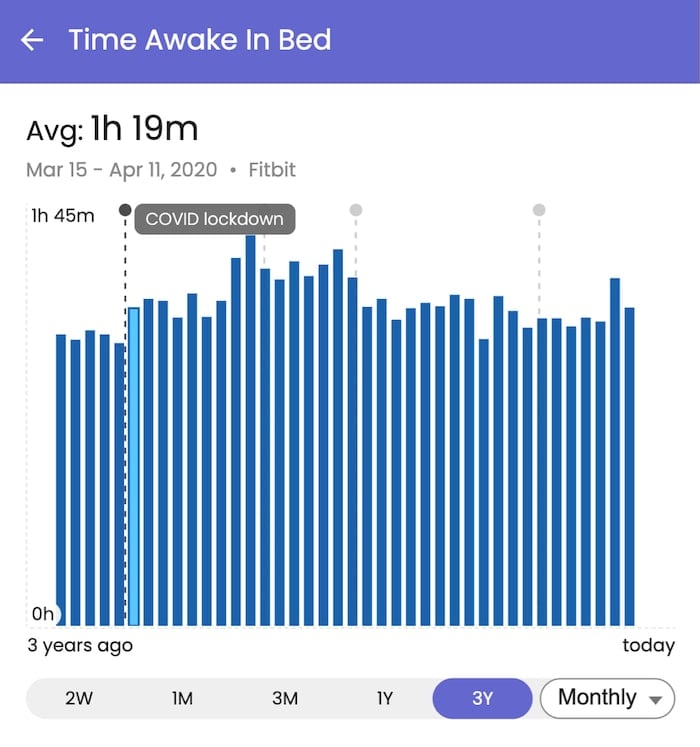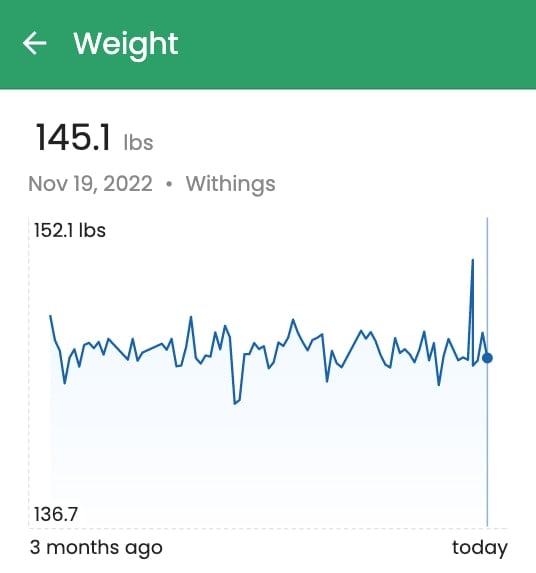For a large part of my life I have always felt tired, and it has happened for so long that I started to think maybe that’s just how everyone felt too. I tried sleeping more, taking vitamin B12, but so far nothing seemed to be working.
However, there were also good days (though rarely) where I would feel super refreshed after waking up. It makes me wonder if it’s something I can control if I can learn what led to those “good days”.

Over the past year, I decided to start tracking my health and my day-to-day to spot patterns that could suggest some lifestyle changes. I figure there’s no better time to start, especially since I’m now working on the personal health tracker app - Guava.
With the help of my Fitbit fitness tracker, Withings smart scale, and logging my day-to-day in the Guava app, I spotted a few patterns that I thought would be interesting to share.
1. Caffeine made me sleep an hour less on average
Going into this, I knew caffeine had an effect on sleep, but I didn’t realize how much the effect was for me. On the days I drank coffee, I slept about an hour less on average!

After seeing this correlation, I started to cut back on my caffeine consumption. It’ll be interesting to see how my sleep pattern changes in the next month or so. Another thing to further investigate is how the timing of my coffee affects my sleep.
2. I spent less time lying awake in bed after more steps
My initial guess was that taking more steps (or physical exercise in general) during the day made me more tired and thus I would doze off quicker.

Looking at my steps and sleep charts over the past 3 years, I could see the trend that when steps are higher, time awake tends to be lower, and vice versa.


However, as we know, just because there’s a correlation doesn’t necessarily imply there’s a cause and effect. Looking at the charts, you can clearly see a few distinct changes in my lifestyle. The first major drop in steps was when COVID-19 started, and the second drop in steps was when I had a knee injury and tore my MCL. Then my steps went up again when the lock down relaxed and I started going outside.
Based on this, another possible explanation of this relationship is perhaps working from home, and recovering from my knee injury caused me to take both fewer steps and have more time awake in bed. That being said, according to this study, increasing step count from 4,000 to 8,000 per day was associated with a 51% reduction in all-cause mortality, so I should walk more anyway!
3. I had more headaches on hotter days
One of the cool features of Guava is that it'll pull in weather factors to compare against my symptoms.

Looking at this correlation, my guess is my headaches might be coming from not drinking enough water on hotter days. It’ll be interesting to start tracking my water intake in Guava to see if that’s indeed the case.

4. I was more tired on days when I weighed more
Over the course of 6 months, I measured my weight with a smart scale every day at roughly the same time (so the measurement was as consistent as possible).

I was surprised at first when I saw this correlation between weight and fatigue, as my weight didn’t change much over the past year. However when looking at the charts, I noticed my weight was fluctuating in a cyclical pattern over time, and when I separated out the days when I was feeling tired vs not, I could see that my weight skewed heavier on days I felt tired.
I still haven’t figured out what’s causing my weight to fluctuate, but perhaps it’s tied to the amount of food I’ve consumed the day before. I’m guessing would have an impact on whether I’m feeling tired the next day too.


5. I got more stomach aches after eating at this restaurant
Speaking of food, I also noticed apparently eating at this local restaurant is related to me having more stomach aches the next day. The food is good though, so I doubt I’ll completely stop going there hah!

6. Playing video games made me take fewer steps, take longer to fall asleep, and be more tired the next day.

I enjoy multiplayer games as they give me a way to connect with friends over distance, though I haven't thought too much about the relationship between gaming and my health before.
Guava has an auto-correlation feature where it runs all of my data against each other to find new correlations, which is how I came across this. All these relationships made sense though, and it was nice to see the extent of the effects so I could use them to make adjustments.
7. My blood pressure may be related to coffee, sleep, and fatty food
Earlier this year I started recording my blood pressure every morning with my Withings cuff, since my blood pressure has been trending higher after my last doctor visit. I have been taking my measurements before any food, drinks, or exercise in order to keep it as consistent as possible.

Even with the small amount of data collected over 45 days, I’m starting to notice some relationships between my blood pressure, sleep, and diet.
I’m taking this with a grain of salt because I only have 45 days of data, but it’ll be interesting to run a few experiments where I completely cut out coffee for a few weeks or deliberately avoid fatty food for a while to see if there are substantial changes. According to this article by Dr. Schneider, eating higher amounts of fats can contribute to high blood pressure, whereas eating more fruits and vegetables can improve high blood pressure. So perhaps I could try making a conscious effort to eat more servings of veggies too.
8. Going on a 15 minute walk 45 minutes after a meal helped stabilize my blood sugar
One thing I suspected that may cause me to be more tired is the change in blood sugar after a meal (know that feeling of drowsiness after a big meal?).
I did a series of lab tests around my blood sugar levels a year ago out of curiosity and I noticed my HbA1c was 0.1% away from being classified as prediabetic.
The HbA1c measurement is related to the average blood sugar levels in the past 3 months, and is one of the main indicators of type 2 diabetes. Given this test result, I decided to make some changes to my lifestyle to correct this before it was too late.

I started exercising more with my Guava co-workers (in particular, doing more HIIT - high intensity interval training), got myself a continuous glucose monitor device from FreeStyle Libre, and started getting periodic HbA1c tests every 3 months to monitor changes.
The most interesting data came from my continuous glucose monitor, where it recorded my estimated blood sugar levels after my meals and exercises. Of the many things I’ve experimented with to stabilize my blood sugar after a meal, the most effective I’ve found was to do a 15 minute walk 45 minutes after a meal. I’ve tried varying the length and timing of the walk, and I found the sweet spot for me was ~45 minutes after.

After some of the lifestyle changes, my HbA1c dropped back down to the 5.4% - 5.5% range. Guava also has an article on tracking and understanding blood sugar in case you’re curious to learn more.
Conclusion
There are quite a few things I’ve learned from recording my health, some expected and some unexpected. I’ve started making some changes to my lifestyle to explore some of these patterns further, and it’ll be interesting to observe over the next few months to see if the number of days I feel tired goes down.
There’s still a lot that can be learned and explored from the information collected from my fitness devices, lab tests, and day-to-day logs. As a next step, I could look into what time I fall asleep or wake up, the amount of food I’m eating per meal, exercise intensity and so on. We could then improve the correlation functionality in Guava to help others discover more about themselves too.
If you’re curious to explore your own health insights, we put together a guide on how to use Guava’s correlation feature to learn more about your health.






